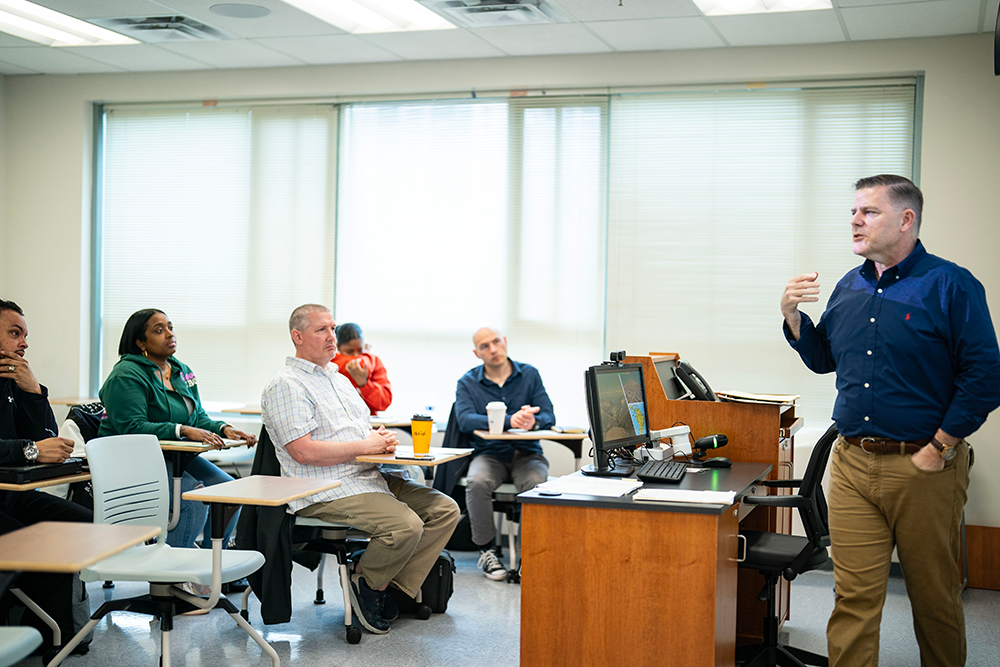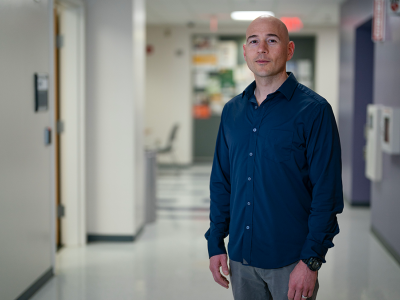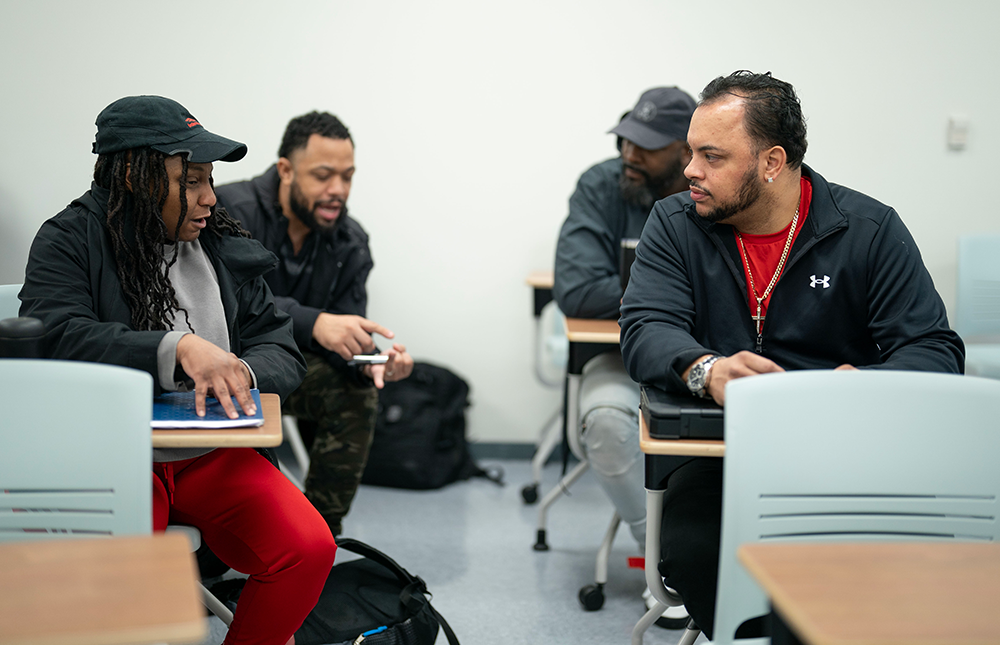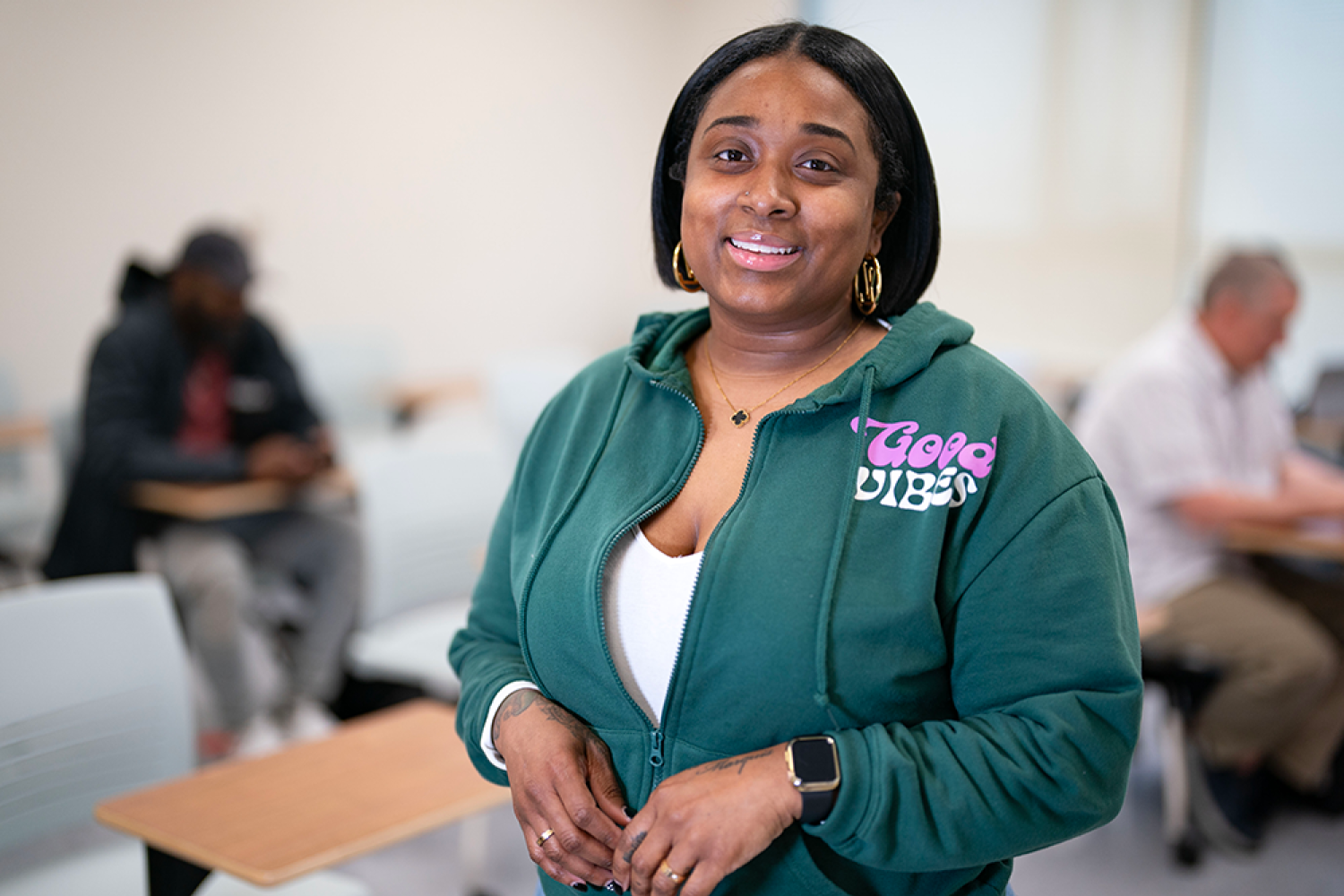On January 17, 23 members of the Metropolitan Police Department arrived at a Northern Virginia Community College campus classroom in Alexandria, Virginia. Conditioned to forging ahead in the face of fear, they were ready to embark on an undertaking of a very different nature.
These officers are the first selected in a new partnership between UVA’s School of Continuing & Professional Studies and the Metropolitan Police Department (MPD). Through 20 courses and 24 months, they will complete their undergraduate degree without incurring personal financial expense. For the MPD, the initiative offers a way to invest in their employees who sacrifice so much of their personal and professional lives. SCPS was a natural fit to deliver the program, given its long history of providing high-quality education tailored for working adults and its deep connection with public safety. For the police officers, the venture means something different to each of them.
MPD Sergeant Shanell Jones said she didn’t believe school had ever been her strength. Born and raised in the city, her teenage years were marked by turmoil and emancipating herself at 16. After high school graduation, Jones entered the MPD as a Police Cadet, earning 60 undergraduate credits to meet the department's education requirement. Strongly valuing her own determination and independence, Jones worked hard to become the Sergeant she is today. When the opportunity to return to school to earn a bachelor's degree presented itself, she knew she had to find space to continue advancing herself. “The journey of education has no ceiling for me. I felt I had the chance to try, and I did,” she stated.
While each member of the 23-student cohort works for the MPD, they had varying levels of familiarity with one another. Now in their second course of the program, they’ve come to know one another on an entirely different level. They’ve bonded over their shared experience. They’ve encouraged one another. They’ve grown through sharing and hearing different perspectives. They’ve made friendships. And they’re bringing all of this back to the MPD, creating change from the inside out.

While teaching the cohort’s second class, SCPS Professor Charlotte Matthews observed what an equalizing environment the classroom is. “These police officers, who are used to an incredibly hierarchical system, take off their mantles when they enter the classroom, and we see them connecting in revitalizing new ways because of it.”
In a breakout group to review essays they had written on a belief they held, Jones was surprised to find MPD Captain David Augustine’s topic was similar to her own. Augustine has been a member of the police force for nearly 19 years. He has held roles from policing in the Capitol Hill neighborhood to Patrol Lieutenant to Director of Risk Management and is currently the Field Commander. Augustine completed an associate degree after high school and entered the force. With no education requirement at the time, he felt his associate degree gave him an added credential.

Over the years, Augustine has sensed his own growing desire to understand more. He sees communities nationwide that are angry. He senses immediate reactions people have when they see his uniform, and he wants to understand why they think what they think. “The more I understand, the more empathy I can offer,” Augustine reflected. Even within the MPD itself, Augustine sees that his role as a leader requires him to guide, mediate and have conversations. “This program is making better people, not just better cops,” Augustine opined.
Jones and Augustine are quick to share that the program is as much guts as it is glory. “Starting the program was intimidating,” Augustine admitted. “There’s been a historic distinction between academia and the police force. The two don’t sit at the same table much. I think we officers were all nervous about how they would look at us. But it’s been everything but that,” he shared, adding that he sees officers eager to learn about their instructors, and instructors eager to learn about students.
“It’s been challenging, but refreshing,” Jones agrees. “I have not been in school for almost nine years now, but I am able to refocus my attention and put effort into my papers and my courses,” she said, adding that she’s finding strength in her classmates who motivate and check in on one another.

The pair agree that even when what they learn isn’t directly related to their work as police officers, it impacts how they navigate their personal and professional lives. They can understand their roles in a different light, placing it into context that considers history, cultures and perspectives.
Michael Daee, an MPD Lieutenant, shared that in his ISLS 3000 Transformations of Writing course, he valued learning how to “express our imaginations and be concise in our words, but from a place of vulnerability and without judgment.” Thomas Roy, an MPD Detective, echoed his belief that most of his classmates will take what they’ve learned with them. “It forced and allowed a lot of us to break out of our robotic police natures and be human.” He continued, “I saw many of us open up about our views on life. As police, we often take on the role of being tough guys, barely showing emotion or feelings. However, I saw us as students, open and ready to learn.”
While a degree may have once been something many cohort members considered unobtainable, Professor Matthews said she sees hope begin to spread amongst them. Observing their increased level of comfort with writing, Matthews thinks Maya Angelou’s assertion that “there is no greater agony than bearing an untold story inside you” is particularly apt for this cohort of students as they open up and share what they encounter every single day in their jobs.
“This partnership has been a great learning experience for not only the students, but for the University and the MPD,” said SCPS Assistant Professor and Senior Program Director David Corlett. “Our hope is that this model of collaboration will lead not just to future student cohorts with the department but partnerships with other police departments and municipalities to help transform public safety across the region.”
